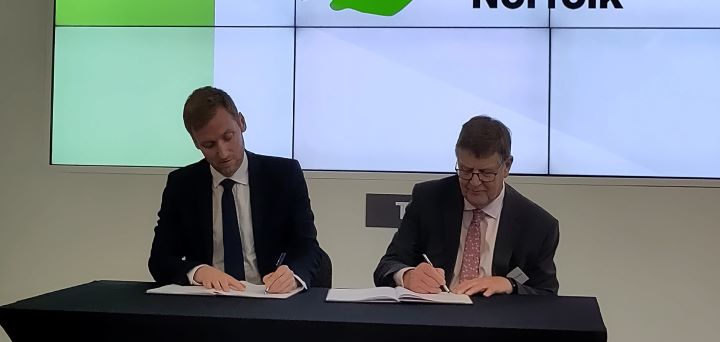Devolution deals for Suffolk and Norfolk have been signed by levelling up secretary Michael Gove, transferring over £1bn of long-term funding to both areas combined.
The proposed deals give Suffolk County Council and Norfolk County Council a directly elected leader to transfer decision-making from Whitehall to the authorities. This will give them greater power over building new affordable homes, regeneration and skills.
Part of the deal for Suffolk includes government investment worth £480m over 30 years, while the deal for Norfolk will award the council additional funding of £600m over the same period. Both authorities will also be handed control over the adult education budget, to ensure they can “shape provision in a way that best suits the needs of residents and the local community”.
Gove said: “Empowering strong local leadership is key to levelling up and ensuring we spread opportunity and unlock the economic potential of communities across the country.
“I am delighted to sign two further historic deals for Suffolk and Norfolk that will see communities handed hundreds of millions of pounds to use as they – not Whitehall – see fit.”
The two local authorities have shown flexibility and pragmatism to adopt a directly elected leader of the county council, which presents a fundamentally new and more suitable model for devolution in county areas.
Funding for regeneration and housing
The deal for Suffolk also includes a multi-year transport settlement at the next spending review, £6m to regenerate brownfield land into affordable homes and £3m to improve energy efficiency and renewable homes.
Matthew Hicks, Suffolk County Council’s leader, said: “On the table are greater decision-making powers around transport, infrastructure, skills and more resources to help us achieve our net-zero ambitions. Ultimately, this significant additional investment will improve the lives and outcomes of Suffolk’s residents.”
The devolution deal for Norfolk will provide almost £7m to support the regeneration of brownfield sites and the council will also receive £5.9m of capital funding in this spending review period to support the delivery of housing, regeneration and development priorities.
Andrew Proctor, Norfolk County Council’s leader, said: “I’m delighted that Norfolk is well positioned to gain additional powers and money to improve people’s lives, thanks to the county deal we have agreed in principle with the government. The aim is for decisions and funding previously controlled in Westminster to be agreed in Norfolk, for Norfolk.”
Both the proposed deals mean that six of the 13 places invited to negotiate devolution in the levelling up white paper have now signed agreements with the government.
The news also comes as a devolution deal transferring new powers and £360m to Cornwall Council was signed on 2 December.
Commenting on the government’s proposal of the devolution deals for Suffolk and Norfolk, Martin Hill, the County Council Network’s spokesperson, said: “The two local authorities have shown flexibility and pragmatism to adopt a directly elected leader of the county council, which presents a fundamentally new and more suitable model for devolution in county areas.”
Both devolution deals are now subject to local consultation and a council resolution to change their governance model so that electors directly elect the council leader. The election of the directly elected leader is proposed to take place in May 2024.
—————
FREE weekly newsletters
Subscribe to Room151 Newsletters
Room151 LinkedIn Community
Join here
Monthly Online Treasury Briefing
Sign up here with a .gov.uk email address
Room151 Webinars
Visit the Room151 channel












